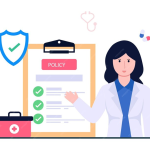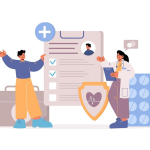
Rehabilitation Services in Healthcare: Comprehensive Care for Recovery and Well-being
Rehabilitation services in healthcare play a crucial role in helping individuals recover from injuries, surgeries, or long-term illnesses. These services offer specialized support for physical, emotional, and cognitive well-being, promoting a complete recovery process.
What Are Rehabilitation Services in Healthcare?
Rehabilitation services in healthcare involve various therapies designed to restore a patient’s health, function, and independence. These services aim to help individuals regain their optimal function following an injury, illness, or surgery.
Whether someone has suffered from a traumatic brain injury, undergone orthopedic surgery, or experienced a stroke, rehabilitation is often essential to the healing process. Healthcare professionals like physiotherapists, occupational therapists, speech therapists, and psychologists provide these services.
Types of Rehabilitation Services in Healthcare
Rehabilitation services in healthcare cover a broad range of treatments and therapies tailored to individual needs. Below are some of the most common types:
1. Physical Therapy
Physical therapy helps patients improve movement, strength, and flexibility. This is particularly helpful for individuals recovering from surgery or injury. Through a structured exercise program, physical therapists assist patients in regaining mobility and reducing pain.
2. Occupational Therapy
Occupational therapy focuses on enabling individuals to perform daily tasks independently. Occupational therapists help patients relearn essential skills such as dressing, eating, or driving.
3. Speech Therapy
Speech therapy is designed to help individuals regain their ability to communicate after conditions like strokes or brain injuries. Speech therapists also assist in improving swallowing disorders and cognitive-communication challenges.
4. Cardiac Rehabilitation
Cardiac rehabilitation supports patients recovering from heart attacks, heart surgeries, or chronic heart diseases. It involves supervised exercise programs, education, and lifestyle changes aimed at improving heart health.
5. Neurological Rehabilitation
For individuals who have suffered neurological damage due to conditions like strokes or spinal cord injuries, neurological rehabilitation is vital. This type of therapy focuses on restoring motor functions, balance, and coordination.
6. Pulmonary Rehabilitation
Pulmonary rehabilitation is provided for individuals with chronic respiratory conditions such as COPD (Chronic Obstructive Pulmonary Disease) or asthma. Patients receive education on breathing techniques, medications, and exercises to improve lung function.
7. Mental Health Rehabilitation
In addition to physical recovery, mental well-being is also a focus of rehabilitation services in healthcare. Counseling and psychological therapy help individuals overcome the emotional and mental challenges associated with long-term illnesses or injuries.
Who Can Benefit from Rehabilitation Services in Healthcare?
Rehabilitation services in healthcare benefit various groups, including:
- Stroke Survivors: Stroke patients often face mobility and speech difficulties. Rehabilitation helps them regain these essential skills.
- Post-Surgical Patients: After major surgeries, like hip replacements or heart bypasses, rehabilitation aids in speeding up recovery and enhancing mobility.
- Trauma Victims: Victims of accidents or physical trauma may require rehabilitation to regain independence and function.
- Chronic Disease Patients: Those living with chronic conditions like arthritis, Parkinson’s, or heart disease benefit from ongoing rehabilitation to maintain their quality of life.
- Elderly Individuals: As people age, maintaining balance, strength, and independence becomes more challenging. Rehabilitation services in healthcare can help older adults stay active and prevent falls.
Importance of Rehabilitation Services in Healthcare
Rehabilitation services in healthcare are more than just treatments; they significantly improve patients’ quality of life. These services allow people to:
1. Regain Independence
After an illness or injury, many individuals struggle with basic activities such as walking, dressing, or eating. Rehabilitation helps patients regain the skills they need to live independently.
2. Improve Mental Health
Recovering from an injury or chronic condition can take a toll on a person’s mental health. Rehabilitation services often include counseling to help individuals cope with the emotional challenges of recovery.
3. Prevent Rehospitalization
Effective rehabilitation can help prevent complications that may lead to rehospitalization. For example, physical therapy after surgery can reduce the risk of falls, and cardiac rehab can reduce the chance of future heart problems.
4. Enhance Overall Quality of Life
Rehabilitation services contribute to an improved quality of life by allowing individuals to participate in daily activities, maintain social connections, and enjoy hobbies they love.
Rehabilitation Process: What to Expect
The rehabilitation process is personalized and varies depending on the patient’s condition. However, the typical rehabilitation process involves the following steps:
1. Initial Assessment
Healthcare professionals perform a comprehensive assessment to determine the patient’s needs and capabilities. This evaluation helps create a personalized rehabilitation plan.
2. Goal Setting
Specific, measurable goals are set for the patient. These goals can range from being able to walk unaided to speaking clearly after a stroke. Goals are adjusted as progress is made.
3. Active Treatment
Treatment includes exercises, activities, and therapies designed to improve strength, coordination, and function. Patients work with their rehabilitation team regularly to achieve their goals.
4. Continuous Monitoring
Progress is continuously monitored to ensure that the patient is on track. Adjustments to the treatment plan may be made based on the patient’s progress.
5. Graduation and Follow-Up
Once the patient has met their rehabilitation goals, they may “graduate” from the program. Follow-up appointments are often scheduled to ensure the patient maintains progress and to prevent any setbacks.
Benefits of Rehabilitation Services in Healthcare
Rehabilitation services in healthcare offer multiple benefits, including:
- Faster Recovery: By engaging in rehabilitation early, patients can speed up their recovery process.
- Pain Reduction: Physical therapy can help alleviate chronic pain through targeted exercises and treatments.
- Injury Prevention: Rehabilitation helps patients regain strength and mobility, which reduces the risk of future injuries.
- Holistic Care: Rehabilitation services take a comprehensive approach, addressing both the physical and mental aspects of recovery.
Challenges Faced by Rehabilitation Services in Healthcare
While rehabilitation services in healthcare offer great benefits, there are also challenges:
1. Access to Services
Not all patients have easy access to rehabilitation services, especially in rural or underserved areas. Limited availability of specialists or lack of transportation can hinder the rehabilitation process.
2. Costs of Rehabilitation
Rehabilitation can be costly, particularly if a patient requires long-term care. Even with insurance, the out-of-pocket costs can be a barrier for some individuals.
3. Adherence to Treatment Plans
Some patients struggle to adhere to their rehabilitation plans, which can slow down recovery. Lack of motivation, emotional difficulties, or misunderstanding of the therapy’s importance may affect patient compliance.
How Technology Is Shaping Rehabilitation Services in Healthcare
Technology is playing an increasingly important role in rehabilitation services in healthcare. Some innovations include:
1. Tele-rehabilitation
With the rise of telehealth, patients can now receive rehabilitation therapy remotely. This is particularly useful for those who live far from healthcare facilities or cannot travel.
2. Wearable Devices
Wearable devices like fitness trackers can monitor a patient’s progress in real-time. These tools help both patients and healthcare professionals track rehabilitation progress and adjust treatment plans accordingly.
3. Virtual Reality (VR) Therapy
Virtual reality is being used in rehabilitation to provide patients with immersive environments for therapy. This technology helps patients practice movement, coordination, and balance in a controlled setting.
Conclusion
Rehabilitation services in healthcare are essential for individuals recovering from illnesses, surgeries, or injuries. These services support physical and mental recovery, improving the overall quality of life. With various therapies available and the integration of modern technology, rehabilitation plays a pivotal role in healthcare.
Frequently Asked Questions
What Are Rehabilitation Services in Healthcare?
Rehabilitation services involve various therapies designed to help individuals recover their health, function, and independence after an injury, surgery, or illness.
What Types of Rehabilitation Services Are Available?
Common types include physical therapy, occupational therapy, speech therapy, cardiac rehabilitation, neurological rehabilitation, pulmonary rehabilitation, and mental health counseling.
Who Should Consider Rehabilitation Services?
Rehabilitation is vital for individuals recovering from surgeries, strokes, trauma, chronic conditions like arthritis or Parkinson’s, and elderly individuals needing assistance with mobility and independence.
How Long Does Rehabilitation Take?
Rehabilitation duration varies depending on the patient’s condition and progress. It may last from a few weeks to several months or longer.
Enhance Patient Care and NABH Compliance with LazyMonkey
LazyMonkey is your all-in-one solution for improving patient care, retaining more patients, and meeting NABH standards. Our powerful QR-based feedback tool enables you to capture real-time insights from patient feedback, discharge surveys, staff and doctor evaluations, and clinical research, while also streamlining inter-departmental communication.
Transform your healthcare facility today - reach out to us at hello@lazymonkey.in, or request a demo here!
Elevate Your Restaurant Experience with LazyMonkey
LazyMonkey’s QR-based feedback system helps you gather real-time insights from customers, track satisfaction levels, and enhance the dining experience. Get instant feedback on your menu, service, and ambience, and make data-driven improvements to boost repeat customers and reviews.
Improve your restaurant today – reach out to us at hello@lazymonkey.in, or request a demo here!
Empower Student Engagement and Campus Improvement with LazyMonkey
LazyMonkey offers a seamless way to gather student feedback, track satisfaction, and enhance campus life. From course evaluations to dorm feedback, our QR-based solution makes it easy to capture valuable insights and improve student retention.
Upgrade your university experience – contact us at hello@lazymonkey.in, or request a demo here!
Streamline Feedback and Drive Performance Across Your Enterprise/Franchise with LazyMonkey
Whether you manage one or multiple locations, LazyMonkey’s QR-based feedback system helps you gather real-time employee and customer feedback. Improve operational efficiency, track satisfaction, and make data-driven decisions to enhance brand consistency and growth.
Transform your franchise today – reach out to us at hello@lazymonkey.in, or request a demo here!
Enhance Customer Satisfaction and Service Standards in Banking with LazyMonkey
LazyMonkey empowers banks to capture real-time feedback from clients across branches. Improve customer experience, assess service quality, and ensure regulatory compliance with our QR-based solution, helping you retain clients and meet banking standards.
Elevate your bank’s customer care – contact us at hello@lazymonkey.in, or request a demo here!
Boost Customer Engagement and Mall Satisfaction with LazyMonkey
LazyMonkey’s QR-based feedback tool enables you to collect feedback from shoppers, track satisfaction, and enhance the mall experience. Gather insights on store services, cleanliness, and entertainment to create an unmatched customer journey.














